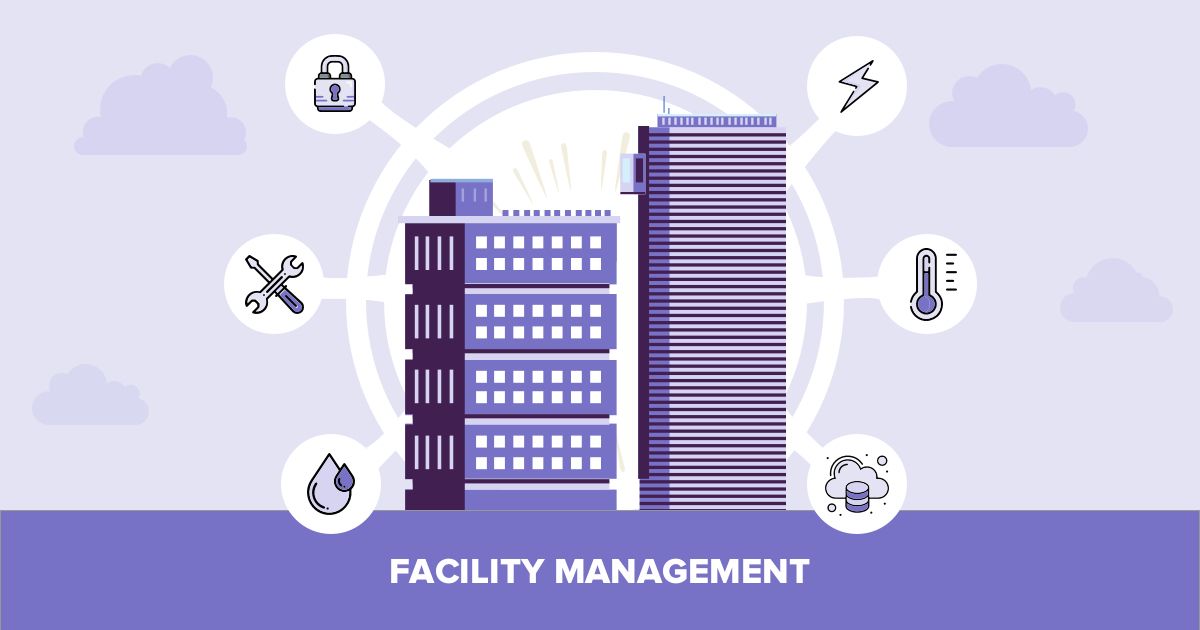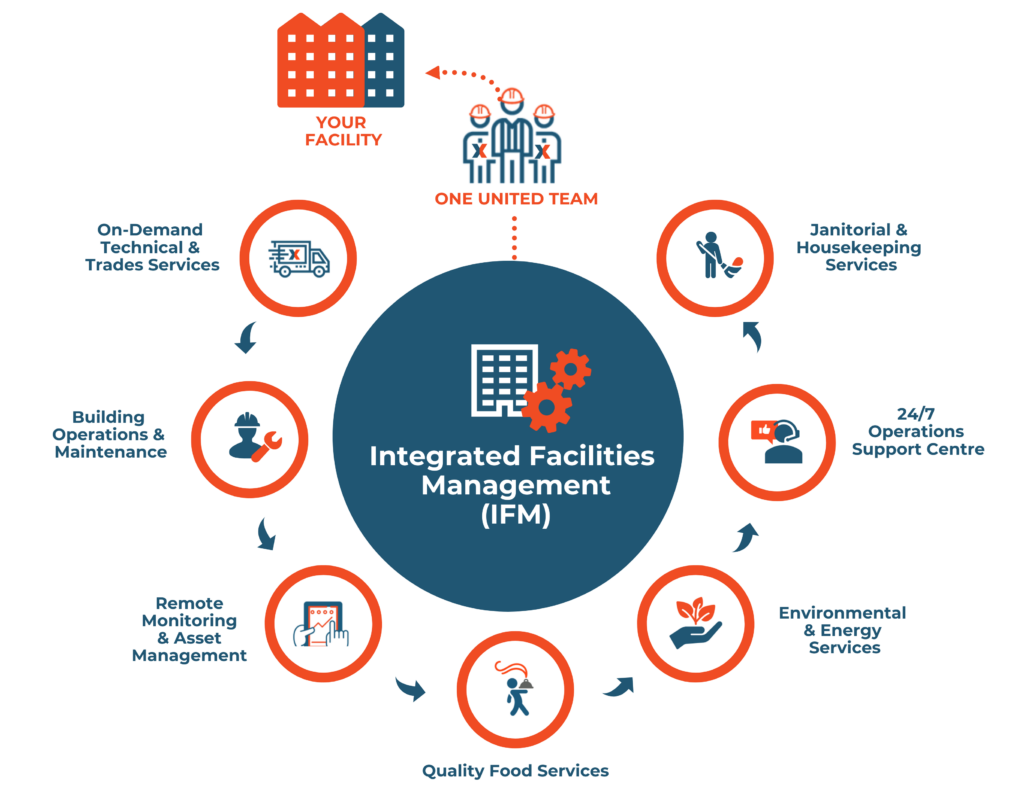The Role of Facility Management in Sustainable Operations
The Role of Facility Management in Sustainable Operations
Blog Article
Secret Patterns Forming the Future of Center Administration in 2024
As we look in advance to 2024, the landscape of facility management is positioned for significant makeover, driven by a number of vital fads. The combination of smart building modern technologies and a change in the direction of data-driven decision-making promise to boost functional efficiency while focusing on sustainability in method.
Smart Building Technologies

Smart building modern technologies incorporate a vast selection of systems, consisting of intelligent lights, heating and cooling controls, and safety systems. By integrating these systems, facility supervisors can keep track of and readjust specifications in real-time, bring about considerable reductions in energy waste and functional costs. Smart sensors can detect occupancy levels and readjust lights and temperature level accordingly, making sure that energy is only made use of when needed.
Furthermore, these technologies help with improved data collection, allowing organizations to track use patterns and identify possibilities for further renovations. The application of smart structure technologies not only adds to sustainability objectives yet likewise develops healthier job settings that can boost employee performance and complete satisfaction.
As we move right into 2024, the adoption of clever building modern technologies will likely accelerate, reflecting a wider change towards more intelligent, responsive, and sustainable center monitoring techniques.
Data-Driven Decision Making
Increasingly, organizations are leveraging data-driven decision making to boost center monitoring methods. By taking advantage of information analytics, center managers can derive workable understandings that significantly boost functional effectiveness and source allocation. The assimilation of advanced technologies, such as IoT sensing units and real-time surveillance systems, enables the collection of huge quantities of data on structure performance, occupancy prices, and power usage.
This wealth of information enables center managers to recognize fads, anticipate upkeep needs, and proactively address concerns before they rise. As an example, anticipating analytics can forecast tools failings, minimizing downtime and repair service expenses. Furthermore, data visualization devices help with better communication among stakeholders, ensuring that educated decisions are made collaboratively.
Additionally, data-driven techniques improve critical preparation by allowing facility supervisors to analyze the efficiency of present methods and make educated options concerning investments in technology or framework. As companies progressively focus on functional excellence, data-driven decision production is poised to end up being a cornerstone of effective facility monitoring strategies in 2024 and beyond. Inevitably, the capacity to utilize information effectively will equip companies to create a lot more effective, productive, and resistant facilities.
Sustainability and Eco-friendly Practices
The focus on data-driven decision making normally aligns with the growing concentrate on sustainability and environment-friendly methods within facility administration. As organizations significantly focus on environmental obligation, center managers are leveraging analytics to optimize source use, reduce waste, and reduce carbon impacts. This tactical method enables the integration of energy-efficient systems, such as LED lighting, wise cooling and heating controls, and eco-friendly power sources into facility operations.
Additionally, the implementation of lasting methods expands beyond energy usage. Center managers are advertising and embracing environmentally friendly products recycling campaigns to create a round economy within their centers. This not just improves the environmental account of the company however also promotes a society of sustainability amongst staff members.
Compliance with ecological laws is an additional essential aspect driving the adoption of green methods. By making use of data analytics, facility managers can check conformity metrics and recognize locations for improvement, ensuring adherence to regional and global sustainability criteria.
Hybrid Work Versions
A considerable shift towards hybrid work versions is improving the landscape of facility administration in 2024. This paradigm you can find out more incorporates in-office and remote job, requiring a reevaluation of space application, source allocation, and employee involvement methods. Organizations are progressively acknowledging the relevance of adaptable offices that accommodate diverse requirements and choices.
Facility supervisors have to adapt by carrying Clicking Here out functional workplace styles that sustain joint initiatives while providing areas for focused job. This includes the assimilation of technology to help with smooth interaction and cooperation amongst in-office and remote staff members. Smart building options, furnished with sensors and analytics, enable for real-time monitoring of space usage, making it possible for companies to maximize their settings effectively.
In addition, crossbreed work models highlight the requirement for efficient facility management that focuses on employee experience. In essence, the crossbreed job version is reinventing facility management, encouraging an aggressive strategy to fulfill the progressing demands of the workforce.
Improved Resident Health
As companies accept hybrid work models, a heightened emphasis on passenger wellness is becoming indispensable to center administration techniques. Facility Management. This change identifies that a healthy and satisfied workforce straight affects productivity and retention prices. Facility supervisors are currently prioritizing settings that promote mental and physical well-being, incorporating aspects such as natural lights, biophilic style, and accessible wellness sources

Innovation plays a critical role in this evolution. Smart Continued building systems can keep track of environmental factors and adjust settings in real-time, ensuring optimal comfort degrees - Facility Management. Feedback devices, such as tenancy sensors and worker surveys, permit center supervisors to continually refine wellness efforts based on owner needs.

Final Thought
In 2024, the future of center administration will certainly be substantially affected by the integration of wise structure technologies and data-driven decision-making, cultivating improved functional performance. Sustainability efforts will prioritize eco-friendly methods, while the appearance of hybrid job versions will necessitate versatile workplace layouts. In addition, an enhanced concentrate on owner wellness via innovative a/c systems and biophilic design will certainly add to healthier workplace. These trends jointly underscore the developing landscape of facility management in reaction to contemporary difficulties and opportunities.
Center supervisors are embracing green materials and promoting reusing campaigns to produce a circular economy within their centers.A considerable change towards hybrid job designs is reshaping the landscape of center monitoring in 2024.Additionally, hybrid job designs emphasize the need for efficient center monitoring that prioritizes staff member experience.As companies embrace hybrid job designs, an increased focus on occupant health is becoming indispensable to facility monitoring methods.In 2024, the future of center administration will certainly be substantially influenced by the assimilation of smart structure innovations and data-driven decision-making, cultivating enhanced operational efficiency.
Report this page